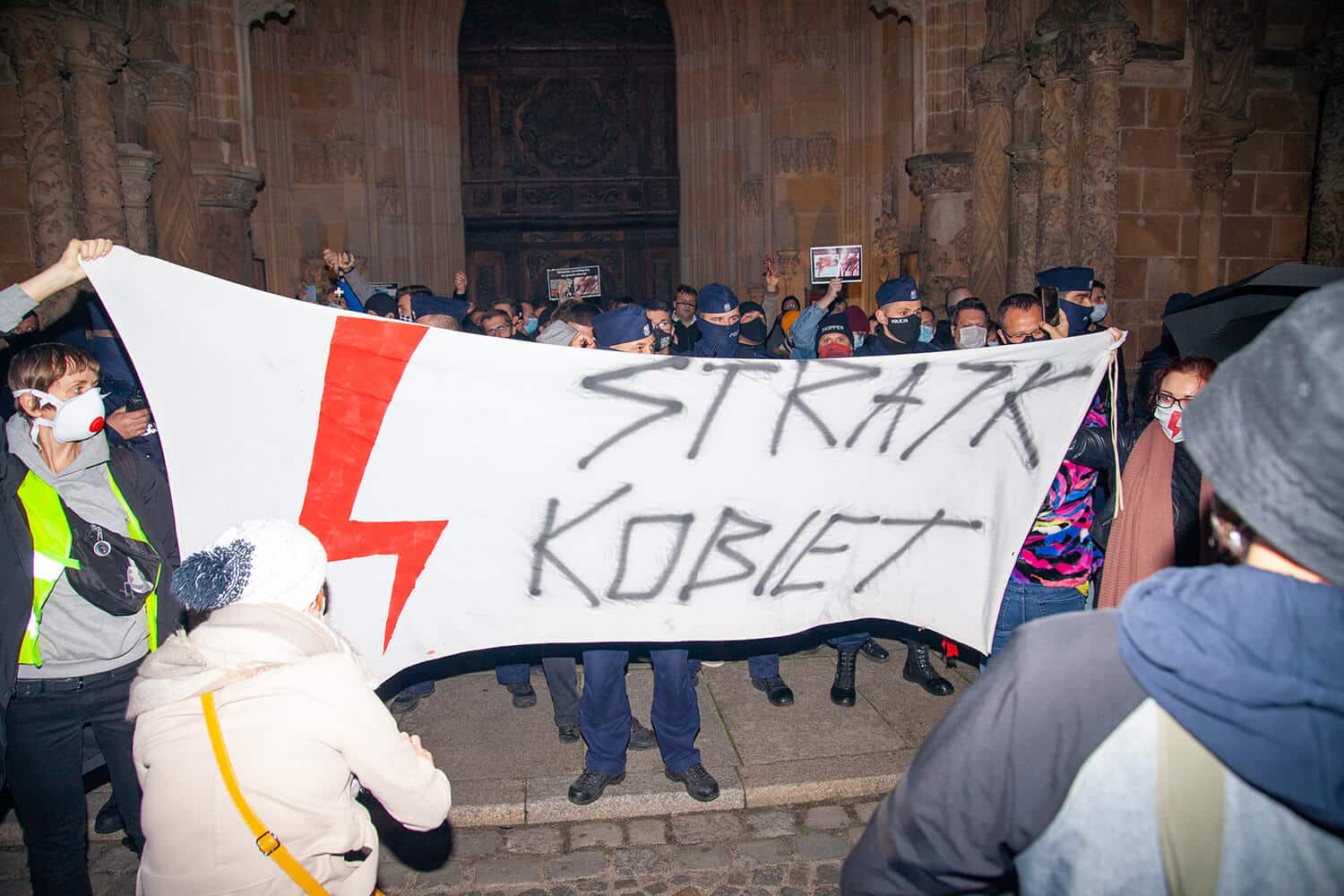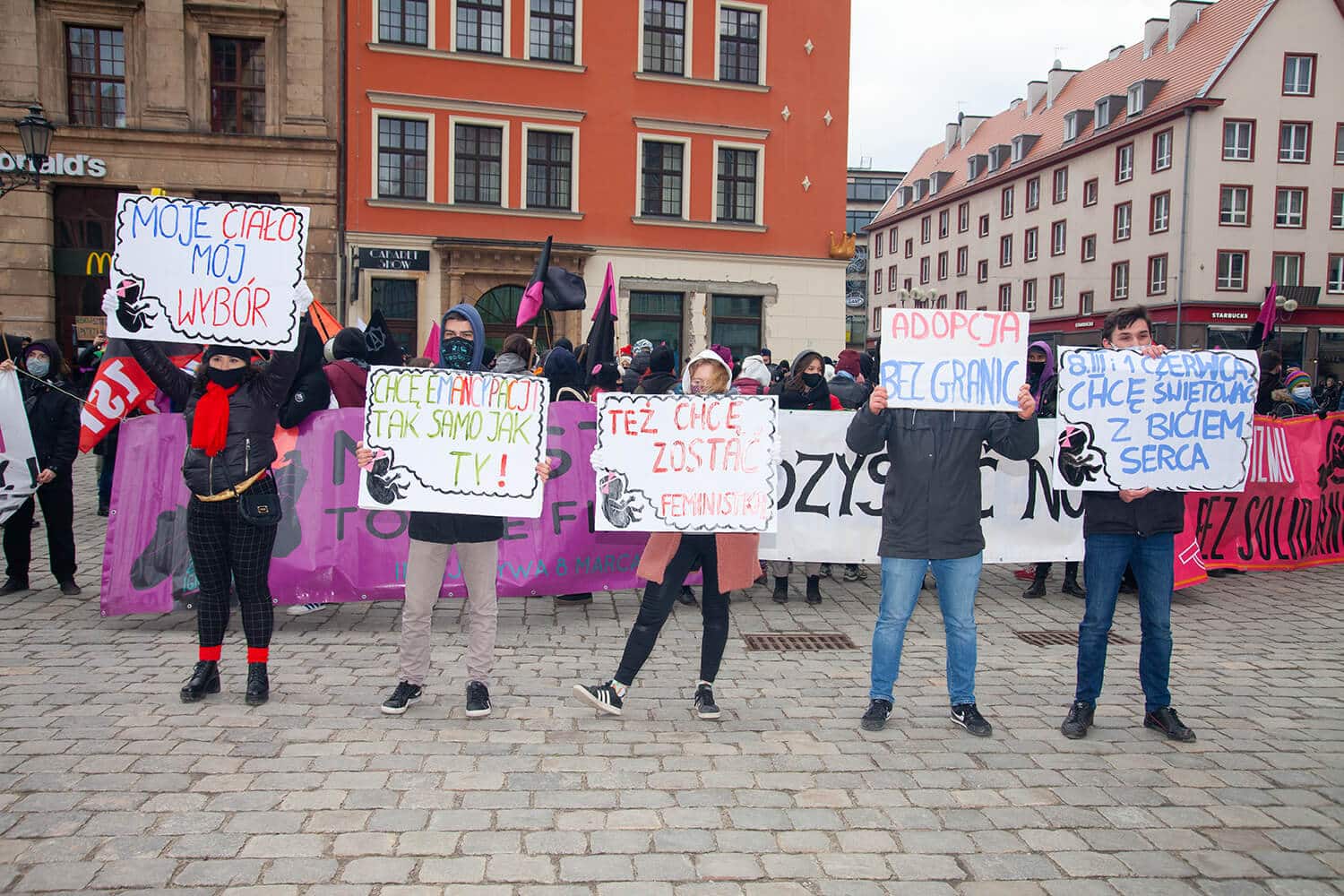This is the first installment of my PhotoBomb Series, in which we look at the trope of photographic intrusion and distraction among a selection of contemporary artists.
We are here in Poland in the good company of Agnieszka Sejud, a visual artist whose practice of fragmentation, superimposition and collage creates a psychedelic extravagance that is both exciting and unnerving. Sejud is also a committed documenter of the current Polish political scene. In exploring her vast archive, two images caught my attention, because examined together, they could be described as a sort of photobomb war on abortion via placards.
The first picture was shot on October 26, 2020 in Wrocław, in front of the Cathedral of St. John the Baptist. It portrays women holding a placard that says strajk kobiet (women’s strike). They place themselves in front of pro-lifers, right-wing anti-abortion church defenders, in order to conceal and protest their messages, which are also conveyed through smaller posters featuring bleeding foetuses and condemning abortion as evil murder.

As Sejud explains:
These posters are signed stopaborcji.pl and belong to the Pro – Prawo do Życia (Pro – Right to Life) foundation, which is responsible for four unsuccessful legislative initiatives to prohibit abortion in Poland. This foundation also conducts disinformation campaigns, organizes exhibitions with photographs of foetuses after abortion or miscarriage, and campaigns against the LGBT community, claiming that homosexuality is related to pedophilia. They conduct training for their activists – they only talk about unborn children, killing children, murder, almost ignoring science, and the fact that abortion is also a medical procedure. It is interesting that they care more about defending ‘unborn life’ than helping those who already exist in the world and actually need help. This year, the organization will organize, once again, a collection of signatures under the civic bill, to ask for a change in the legal definition of the word ‘child’ as a human being from the moment of conception.
The second picture was shot on March 7, 2021 in Wrocław’s Market Square, where every year local women hold a demonstration around International Women’s Day. It portrays another disruption, but with the roles reversed. This year, the march was supposed to draw attention to the invisible and often unpaid work of women. The beginning of the demonstration was disrupted by a temporary invasion of so-called “anti-choice” activists from the national Catholic youth organization Młodzież Wszechpolska (All-Polish Youth) (you can watch the video here). Intriguingly, they used similar slogans to those employed by their antagonists on their banners, the so-called “pro-choice” activists, but they reversed the meaning by having the foetuses appear to utter the sentences. Feminists slogans such as “my body my choice”, “I want emancipation as much as you do” and “I also want to be a feminist” were now coming out of the imaginary mouths of hand-drawn foetuses, like speech balloons in comic books. Apparently conscious of the visual power of photography and its propagandistic effect, they photobombed feminist activists with their banners saying things like “I didn’t come out of your rib, you came out of my womb – Eve” or “Equality not flowers”, posed for the camera with their own inverted reactionary slogans, and disappeared after a while.

As Sejud explains:
Abortion in Poland was available upon request until 1993. At that time, 80-140 thousand procedures were performed annually. Then the possibility was limited to three reasons: 1. when pregnancy poses a threat to the life or health of a woman, 2. when prenatal tests or other medical reasons indicate a high probability of severe and irreversible foetal impairment or an incurable life-threatening disease and 3. when there is a justified suspicion that the pregnancy was a result of a prohibited act. The occurrence of this circumstance has to be confirmed by the prosecutor. On October 22, 2020, the politicized Constitutional Tribunal established that the premise concerning foetal defects was inconsistent with the Polish Constitution. This entailed an almost complete ban on abortion, since in the last few years the numbers dropped to 1,000 legal procedures performed annually, of which around 95% were due to foetal defects. The Tribunal’s conservative intervention sparked massive protests. They took place as traffic blockades, great marches, bicycle critical masses, protests in front of churches and the headquarters of the Prawo i Sprawiedliwość (Law and Justice) party.
Federica Chiocchetti/Photocaptionist